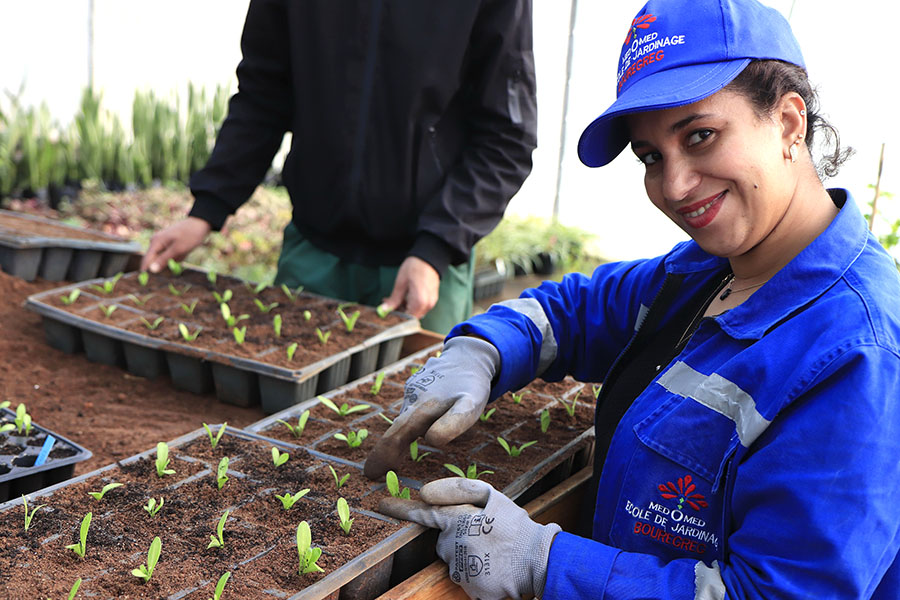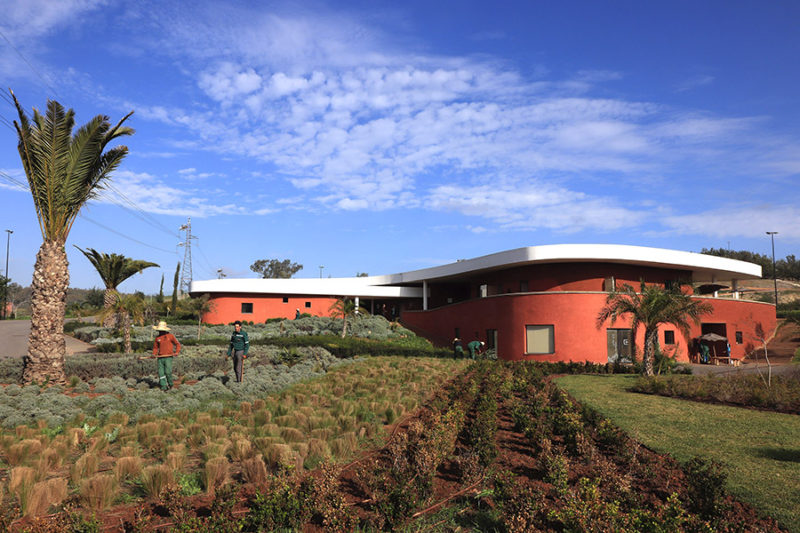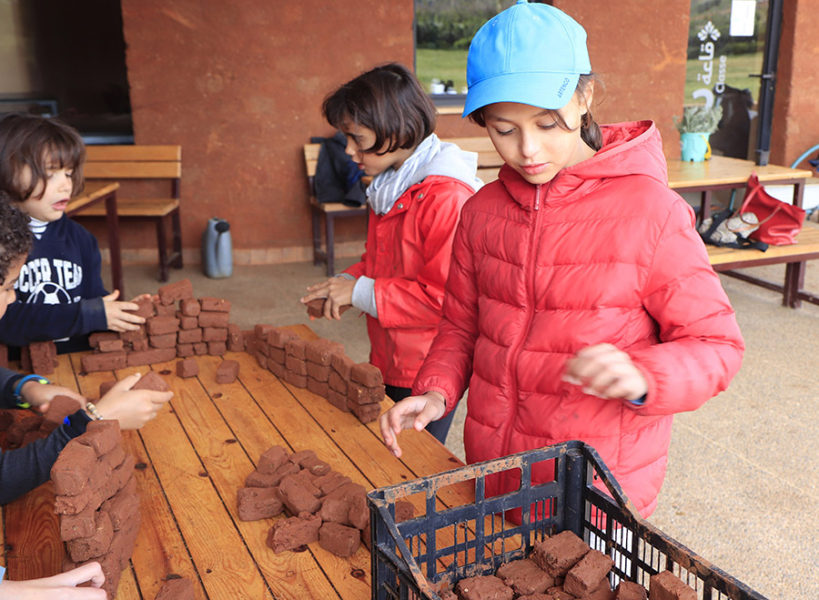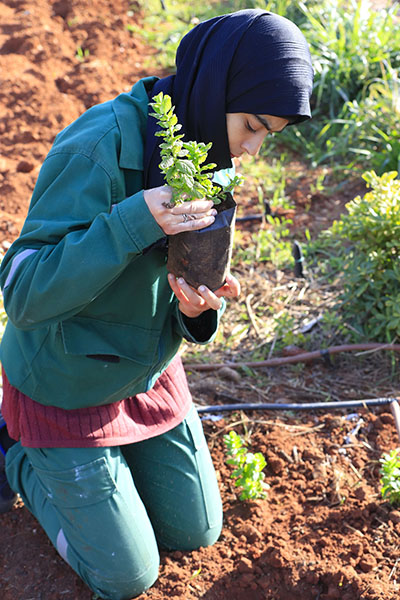The Med-O-Med gardening school in Salé, Morocco, is now in its fifth year of operation, and the second class of apprentices has graduated. Even so, work and effort continue unstintingly to push forward this great structuring and multi-faceted project. This “addictive and exciting” project, in the words of Enrique de San Julián, who was in charge of training at the beginning, is gradually consolidating and developing its various components. Formation, professional integration, environmental awareness and economic sustainability are the pillars on which it is based.
As a reminder, the Med-O-Med Gardening School is a vocational training centre for young people in difficult circumstances, recognised by the Ministry of Vocational Training, and designed and managed by the Islamic Culture Founation as part of its Med-O-Med development network. But it is also a space for environmental awareness and green leisure for the public, as well as a production nursery.
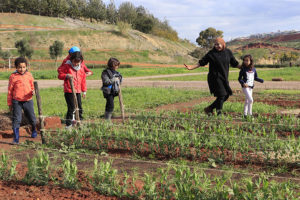 The centre, which is spread over eight hectares located next to the first rehabilitated local landfill site in Morocco, is filling up not only with the joyful presence of the apprentices, as they carry out their practical training, but also with public activities. Children’s workshops and associative visits are gradually filling the plots with colour and animation. In this regard, an agreement has been signed with the School of Nature for the implementation of a series of themed training courses for children, based on life in the countryside: preparing a vegetable garden, building in adobe, creating a chicken coop, are just some of the subjects that the young and enthusiastic gardeners learn about. This, as well as responding to a growing demand for training in rural issues, is helping to integrate two of the school’s apprentice laureates, Imam and Yamila, who are proving to be excellent instructors.
The centre, which is spread over eight hectares located next to the first rehabilitated local landfill site in Morocco, is filling up not only with the joyful presence of the apprentices, as they carry out their practical training, but also with public activities. Children’s workshops and associative visits are gradually filling the plots with colour and animation. In this regard, an agreement has been signed with the School of Nature for the implementation of a series of themed training courses for children, based on life in the countryside: preparing a vegetable garden, building in adobe, creating a chicken coop, are just some of the subjects that the young and enthusiastic gardeners learn about. This, as well as responding to a growing demand for training in rural issues, is helping to integrate two of the school’s apprentice laureates, Imam and Yamila, who are proving to be excellent instructors.
Children’s workshops and associative visits are gradually filling the plots with colour and animation.
Contracts for the professional insertion of students and their external training placements have also increased, including the utility company ARMA, NIMAR (Netherlands Institute of Morocco), as well as various private clients. As for the gardening services, they continue at a good pace, but at a leisurely pace, as they require considerable human resources and mobility. These services, offered by the school itself, are a way to generate some small income for the school, while serving as a diversified practice for the trainees and an attraction for their future employability.
In addition to these paid services, the school has participated in several social actions in the surrounding area, which serves to reinforce the social fabric and stimulate the apprentices. This has been the case, among others, with the the Sidi Hamida school in Salé, and the association Sable et Cahiers, in Skhirat, where the apprentices, accompanied by their trainers, have landscaped the green spaces.
Production and the nursery
During this academic year, plant production has increased and a new shade-house and a greenhouse are being built. The nursery will become one of the main sources of income for the school, which is aimed at progressive partial self-financing through its income-generating activities: space rental, plant sales, gardening services and specialised courses.
However, in addition to these paid services, the school has participated in several social actions in the surrounding area, which serves to reinforce the social fabric and stimulate the apprentices.
The nursery is also part of the pupils’ practice, and provides plants for the school’s playground and for external services.
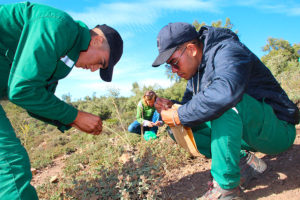 In order to increase its vocation for the production of native plants adapted to climate change, the school has undertaken several excursions during these months led by the producer, Pablo G. Watson, and several groups of apprentices, to collect seeds of endemic species. Little by little, the plants are in demand by landscape gardeners who are aware of the need to reverse the current gardening models and move towards regenerative models.
In order to increase its vocation for the production of native plants adapted to climate change, the school has undertaken several excursions during these months led by the producer, Pablo G. Watson, and several groups of apprentices, to collect seeds of endemic species. Little by little, the plants are in demand by landscape gardeners who are aware of the need to reverse the current gardening models and move towards regenerative models.
Cultural and environmental awareness
Environmental and cultural awareness is another focus of the project, not only for the trainees, but also for the public.
Thus, during these months, the school has organised several events, including the conference on “Ibn Arabi, l’islam en toute universalité”, given by the Sufism specialist Muhammad Valsan. Also, the presentation of the book “Anesthésiés, l’humanité sous l’emprise de la technologie”, by Diego Hidalgo Deumeunois, and the seminar “Vers un paysagisme régénérateur” with several specialists in the field.
The nursery is also part of the pupils’ practice, and provides plants for the school’s playground and for external services.
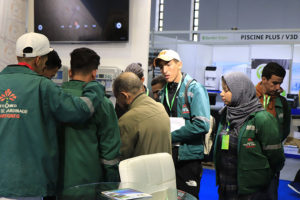 In addition, the youth took part in various external activities of great interest, including the Expo Garden – the first gardening fair held in Morocco, in this case in Casablanca, where the school was present with a stand and a series of activities. It was also an excellent occasion for the employability of young people through the contacts established with numerous professionals in the sector. Another of the most successful activities was the visit to the exhibition Sira Annabaouiya (life of the Prophet Muhammad), organised at the headquarters of ICESCO (Islamic World Educational, Scientific and Cultural Organisation) in Rabat, and to the recently inaugurated Andalusian garden of the Kasbah of the Oudaya, following its recent – and brilliant – refurbishment. At the same site, the trainees had the opportunity to visit the recently inaugurated jewellery museum. These activities not only took them out of their routine, but also provided them with a different and enriching perspective.
In addition, the youth took part in various external activities of great interest, including the Expo Garden – the first gardening fair held in Morocco, in this case in Casablanca, where the school was present with a stand and a series of activities. It was also an excellent occasion for the employability of young people through the contacts established with numerous professionals in the sector. Another of the most successful activities was the visit to the exhibition Sira Annabaouiya (life of the Prophet Muhammad), organised at the headquarters of ICESCO (Islamic World Educational, Scientific and Cultural Organisation) in Rabat, and to the recently inaugurated Andalusian garden of the Kasbah of the Oudaya, following its recent – and brilliant – refurbishment. At the same site, the trainees had the opportunity to visit the recently inaugurated jewellery museum. These activities not only took them out of their routine, but also provided them with a different and enriching perspective.
Knowledge transfer and challenges ahead
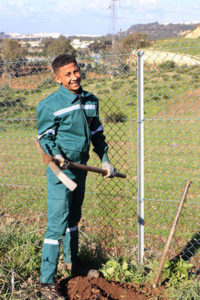 This year, we can say that we are increasing the “transfer of knowledge” to promote the “Moroccanness” of the project. The trainers Lucia Aloise, Mustapha Belharcha and Abdou Idrissi have been joined by the young Lahcen Chakik, as a trainer in training. The assistants recruited last year from among the graduates, Fouad Baiza, Abdellatif Sasy and Imad Bouhmama, as well as Fatima Zohra Njoum in the nursery, are also continuing to work on the project and are all doing an increasingly professional job, which, why hide it, makes us very proud.
This year, we can say that we are increasing the “transfer of knowledge” to promote the “Moroccanness” of the project. The trainers Lucia Aloise, Mustapha Belharcha and Abdou Idrissi have been joined by the young Lahcen Chakik, as a trainer in training. The assistants recruited last year from among the graduates, Fouad Baiza, Abdellatif Sasy and Imad Bouhmama, as well as Fatima Zohra Njoum in the nursery, are also continuing to work on the project and are all doing an increasingly professional job, which, why hide it, makes us very proud.
Another of the most successful activities was the visit to the exhibition Sira Annabaouiya (life of the Prophet Muhammad), organised at the headquarters of ICESCO.
Even so, we cannot omit the difficulties and challenges that schools have to face. The main one is school-dropping, due to the pressure from families to work alongside them or to look after them, in a culture where lack of constancy and projection towards the future are frequent. It is therefore important to work not only on the mentality of the apprentices, but also that of their families.
It is also essential, although progress is undoubtedly being made, to change mentalities regarding the profession of gardener and to ensure that boys and girls have access to recognised and remunerated jobs commensurate with their abilities, after three years of vocational training. Another challenge is the professional integration of young female graduates, in an area where women are still conspicuous by their absence, except in second-class jobs. In this respect, we have found that they are excellent as instructors for children and people with special needs, and that their demand is great, thus opening up a promising horizon for them.
Another challenge is the professional integration of young female graduates, in an area where women are still conspicuous by their absence, except in second-class jobs.
Finally, it is worth mentioning that all this work and effort made by the FUNCI team and the school would not be possible without the unconditional support of the Ministry, the INDH (National Initiative for Human Development), the Spanish Cooperation, the Drosos Foundation and the French Embassy, among other institutions. Thank you!
The Islamic Culture Foundation
This post is available in: English Español

